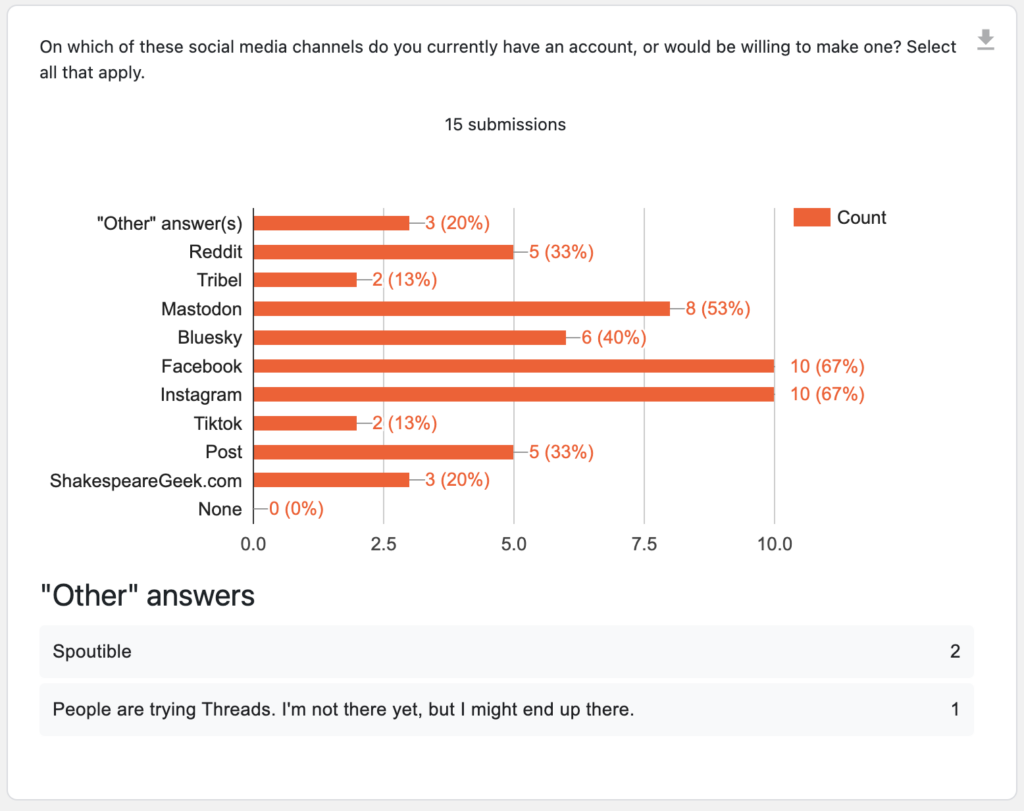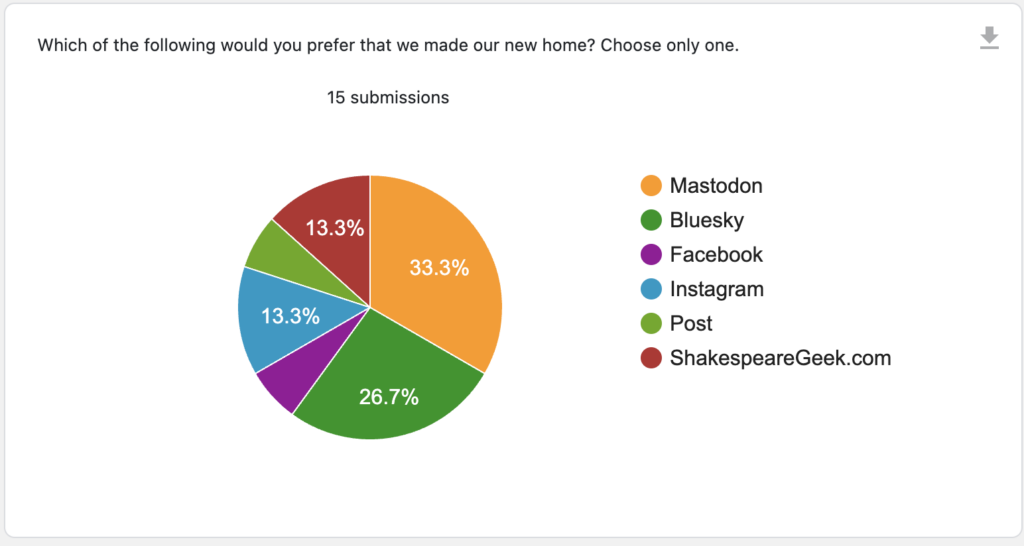Take a trip with me. It’s gonna be a long one, but hopefully worth it. And there’s even plenty of Shakespeare.
I was born in 1969, so I’m not exactly “Woodstock” age. But that didn’t stop me from loving that era. My college years were spent with a lot of long hair and tie-dye (but not any drugs, in case anybody thinks that’s implied). Somewhere along the line I found HAIR, I can’t remember. I probably recognized the “What A Piece of Work Is Man” song then, but I don’t think I knew how much Shakespeare was in there.
A few years out of college, my girlfriend (whose pet name was “Starshine”) and I travel to DC at my friend’s invitation to go see HAIR live for the first time. After a microphone-wielding hippie is surprised to discover that we know the words to “Good Morning, Starshine,” we’re pulled up on stage to dance with the tribe. Core memory locked.
Fast forward a few years. I have taken myself away for the weekend, traveling to see two shows – King Lear and HAIR. The girl from the previous story is long gone, but I’m dating someone new who will ultimately become my wife. She joins me for HAIR. Hey, we’d just started dating; I wasn’t going to make her sit through King Lear with me so soon (that’d come almost 20 years later).
Years go by, we get married and have kids. I’ll tell you something about when you have kids. You will sing lullabies. You will also get sick of singing the same songs repeatedly, so you will sometimes sing anything you know all the words to. Do you know what I sang to my kids? “Gimme a head with hair, long beautiful hair….” But also, “What a piece of work is man, how noble in reason….” because if you didn’t know, that entire speech is set to music in the show. Hey, I thought, they’re too young to understand the words. But they’re going to end up memorizing it. And one day, they’ll understand.
I have a very specific memory of my 3yr old son demanding that I sing Shakespeare one night. When I started to sing “What a piece of work is man,” he stopped me and demanded that I sing Shakespeare, not Hamlet. He wanted Sonnet 18. Who thinks I’m kidding?
It’s not a stretch to say that my children have grown up literally since birth sharing my love for Shakespeare due very much to the musical HAIR. This show holds a very special place in my heart. It represents both my youth and my journey to parenthood, all set literally to the tune of Shakespeare.
And today, we came full circle as I took them to see the show for the first time at the Seacoast Rep in Portsmouth, New Hampshire. I tried very hard on the hour ride to the theatre not to bore them by talking their ears off. “Remember how I used to sing you what a piece of work is man? That’s from this show. I mean, well, it’s from Hamlet, obviously, but it’s set to music because of this show.”



Tears of joy rose in my eyes as we sat down to a 30-year flashback. Only now could I experience it with my kids. I squeezed my wife’s hand and said, “This is my youth. I am so very happy right now.”
I told my daughter after the show that openings are everything to me. I have heard “Two households, both alike in dignity” a thousand times. But still, every single time I hear it live? Lightning bolts up the spine. It’s like that first jolt that tells you the roller coaster has started. So it is with the opening bars of “This is the dawning of the age of Aquarius…” I am instantly transported.
I can’t and won’t review the whole show here because it’s not a Shakespeare show. There is, however, a lot of Shakespeare in it, so I think I’m justified in talking about it. Let me hit the highlights:
- During a hallucination sequence where Abraham Lincoln comes out, followed by John Wilkes Booth, Booth is dressed as Hamlet. He’s literally carrying a skull. I have no idea if this is usually how it’s played (I can’t remember ever seeing it before) or how many people in the audience get that reference, but I absolutely loved it.
- I wish I had a picture to justify this next one. Work with me for a second. This show had circus acrobatics during the slower songs. There were aerial silks and the hoop. I wish I knew if it had a different name. The hoop is on the ground, and somebody (sometimes two somebodies) performs inside it. Well, during the What A Piece of Work Is Man song, the aerialist(?) who’s been working the hoop comes out in a flesh-colored speedo and poses, and I think, “Oh, shit, that’s Vitruvian Man!” So we’re mixing our Shakespeare with da Vinci? Awesome.

- When Claude wakes up from his hallucination (immediately after this song), Berger says to him, “Welcome back, Shakespeare.” I have no idea if that’s always in there or not, but I love the direct shout-out to the man. There’s a lot of American history in this place, but I know of no overt Shakespeare references in the dialogue.
- The finale kicks in for me as the opening does; it sends lightning bolts straight up my spine. There’s a lot of Shakespeare in it, too – the background harmony is singing Romeo’s last words to Juliet before seamlessly moving into “The rest is silence…” When you know it’s there, it’ll give you chills every time. Unfortunately, I don’t think it stood out this time, but that’s only because Claude, who was singing lead at that time, destroyed it. He’d been doing a stellar job all show, but most of his songs were high-energy numbers coupled with frantic dance numbers. The finale is just him bringing the house down, and I’ll tell you, he hit a couple of notes that there touched my soul. Damn.
I have to wrap this up it’s gone on too long. During intermission, a member of the tribe came out to chat and I told him what I said above, that this has been a 30-year trip for me that now I get to share with my kids. It would be appropriate for this show to talk about psychic powers, and my man got the message. During the finale he came into the audience to grab my kids and drag them on stage to dance with the tribe, just like I did in another life. (Unfortunately, he grabbed two out of three, probably because he only had two hands. And it was a small theatre where I think only my kids were brought up, so there wasn’t a steady stream of people my daughter could join. When I went, it was a big stage and dozens of people were pulled up. So she chose to stay in her seat.)
Thank you, Tribe, for a memory that I hope with all my heart, keeps the cycle in motion. Who knows, maybe thirty years from now they’ll be writing somewhere for their own audience, telling them about how they brought their children.
Let the sunshine in.





